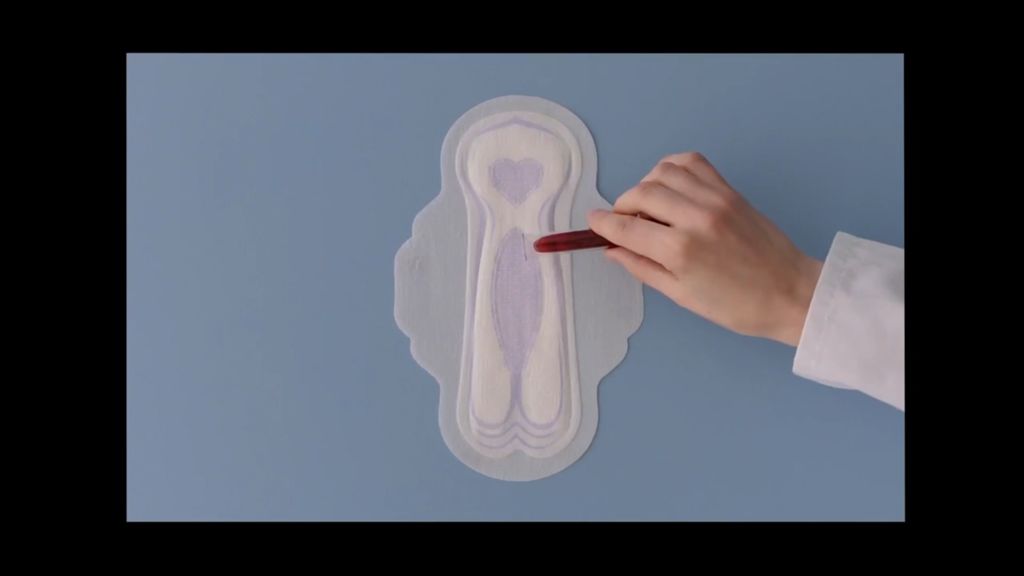Canesten undresses the truth about vaginas
We hear from AnalogFolk about a new campaign for Canesten which combines myth-busting with education to radically alter the way we approach vaginal health, embracing truths and destroying taboos.
When AnalogFolk London was tasked with creating a conversation-starting, shame-free educational campaign for Canesten, that would stop speculation around vaginal health, they knew the road wouldn't be an easy one.
For a start, getting consumers to interact with the antifungal medication outside of specifically needing it was a challenge. The topic is still seen as taboo by many, with conversations avoided and information only sought when there's already a problem. But, by honing in on how the brand could help educate consumers around vaginal health, busting some of the taboos and myths surrounding the issue, Canesten's The Truth, Undressed campaign is following in the footsteps of brands such as Libresse, which has revolutionised the way in which feminine hygiene products are advertised.
Below, we hear from AnalogFolk's Strategy Director Alisa Maul, Creative Director Amandine Fabian, Senior Creative (Copywriter) Jacqueline Hedge, and Senior Creative (Art Director) Gracie Hawes, who explain the bold approach of the campaign which combines in-depth research about the issue with an educational programme, called the Vagina Academy - first launched in Brazil last year - and which aims to eradicate shame and bolster understanding.
Credits
powered by
- Agency AnalogFolk/London
- Production Company Untold Fable
-
-
-
Unlock full credits and more with a Source + shots membership.
Credits
powered by
- Agency AnalogFolk/London
- Production Company Untold Fable
- Creative Director Amandine Fabian
- Executive Producer Stuart Pearman
- Producer Joanna Charalambous
- Creative Director Sara Pouri
- Copywriter Tabitha Burns
- Copywriter Jacqueline Hedge
- Art Director Gracie Hawes
- Producer Molly Carter
- Producer Natalie Dobbin
- Executive Producer Charlotte Ludlow

Credits
powered by
- Agency AnalogFolk/London
- Production Company Untold Fable
- Creative Director Amandine Fabian
- Executive Producer Stuart Pearman
- Producer Joanna Charalambous
- Creative Director Sara Pouri
- Copywriter Tabitha Burns
- Copywriter Jacqueline Hedge
- Art Director Gracie Hawes
- Producer Molly Carter
- Producer Natalie Dobbin
- Executive Producer Charlotte Ludlow
Above: The hero social film from The Truth, Undressed.
This is a different approach for Canesten; can you tell us why you decided to take this route?
AM: While Canesten is the market leader in anti-fungal treatment globally, the brand faces a problem many healthcare brands can relate to; people only ever interact with Canesten when they have a problem and they need a quick fix to treat their health issue. So, we wanted to help Canesten establish a long-term, emotional relationship where they can add meaningful value to people’s lives and encourage them to be more proactive about their health. This meant that we had to fundamentally shift our brand approach and put purpose at the heart of what we do.
What we needed to do was to eradicate shame and bust these myths and provide people with real medical knowledge when it comes to vaginas.
Interviews, desk research and a deep dive into emotions and sociology revealed that the feeling people associate with having a vaginal infection wasn’t just embarrassment. It was a more intense, enduring emotion causing feelings of disgust, anger and apologies. That feeling was shame; shame which even prevents consumers from saying the word vagina or telling a doctor about vaginal health issues. Shame leads them to turn to the internet when they have a problem or they are worried about their bodies. But the internet is a place where myths and misconceptions flourish. Myths that Thrush and BV [bacterial vaginosis] are STIs and have something promiscuous about them, or that vaginas are supposed to look a certain way. Information that is not only false but can also harm people on a physical and emotional level.
What we needed to do was to eradicate shame and bust these myths and provide people with real medical knowledge when it comes to vaginas. We established Canesten’s brand purpose to “help people set themselves free from shame and discomfort”, which resulted in a global educational programme, Vagina Academy, that piloted in Brazil and is now being rolled out in the UK under The Truth, Undressed. We want to make sure that vaginal health is normalised and people have the courage to openly talk about their bodies going forward.

Above: Some of the statistics uncovered by research undertaken for the Canesten campaign.
Were you surprised by the research [only 6% of UK women aged 18-24 found out about intimate health conditions through school and university education] and how much did that play into the campaign approach?
JH: It was more of a sad confirmation rather than a shock. Anecdotally, anyone around us who knew anything had learnt it from being online, or been taught by experience. As it’s a topic that isn’t discussed within most families unless absolutely necessary, you can see how this could spread to not being talked about anywhere until it’s absolutely necessary, which is normally when someone becomes ill. This research played a fundamental role in our decision to work with The PSHE Association [Personal, Social, Health and Economic] as we realised that no matter how famous the campaign could be, nothing was going to fundamentally change unless the education system got involved.
It’s bizarre to think that kids can have the opportunity to dissect frogs... but, when it comes to our genitals, it’s deemed wrong to see anything real because it’s taboo.
This got us thinking about what we would have needed from an education that would set us up well to deal with life. The ability to learn from reality was one aspect. It’s bizarre to think that kids can have the opportunity to dissect frogs and look at real hearts and lungs to understand how bodies work but, when it comes to our genitals, it’s deemed wrong to see anything real because it’s taboo.
A huge step in increasing understanding and breaking taboos about vaginas and vulvas is to start creating realistic, non-sexualised images, and to have those images exist for a reason other than entertainment. This was the perfect opportunity to do that, and add to the new intimate health education programme so that people can make better decisions about their vaginal health.

Above [clockwise from top left]: Amandine Fabian, Alisa Maul, Jacqueline Hedge and Gracie Hawes.
Products like Canesten, and the need for them, is a taboo area; was there much concern that consumers might shy away from engaging with such a bold campaign?
AF: Times are changing. The reality is that people are starting to be a lot more open with their experiences, whether that’s amongst friends, or on places like TikTok, where there are several brave young people talking openly about various experiences that can come with having a vulva, and getting a lot of engagement in doing so. If you look at the comment sections, whilst there’s the occasional “you’re all too comfortable on here” and complaints of “TMI”, there are many others who are grateful that topics like having larger labia or anything to do with discharge is getting some public discourse.
Anyone who has grown up with the internet has most likely come across far more shocking or uncomfortable things than a nude vulva.
For better or for worse, anyone who has grown up with the internet has most likely come across far more shocking or uncomfortable things than a nude vulva in a lifestyle setting. And if they feel uncomfortable, they can ask themselves why they feel that learning about vulvas is not easy for them or embarrassing. The microsite [www.truthundressed.co.uk] is a place that can be visited in privacy and while remaining anonymous. It was up to us to make sure that the topic was addressed in a way that was approachable and down to earth so that we could provide an answer to the desire to learn that is already there. We give credit to Canesten for their bravery in pushing education as a priority.
Above: Some of the illustrations used in the PSHE Association'a learning programme, Vagina Academy.
Why do you think Canesten and other intimate health brands haven't approached their advertising in this way before?
JH: I think the fact that we only got red liquid in a period product ad recently is a good marker of where we actually are with society being comfortable with vaginal health being a topic of public conversation. People are still outraged at the sight of a perfectly healthy spot of blood on clothing, to the extent that images get flagged and taken down on Instagram. If the idea of the functions of a healthy vagina are already considered shocking or disgusting to some, you can see how far we have to go before people are willing to publicly discuss the ins and outs of what can happen when things aren’t quite right without feelings of shame or embarrassment, or fear of backlash.
The fact that we only got red liquid in a period product ad recently is a good marker of where we actually are with society being comfortable with vaginal health.
We’re still in a time where our first experience of these kinds of conversations might have been a whispered exchange behind closed doors between a mother and daughter, and these details might not be shared with male family members. Whilst we’re starting to see changes in the way women’s bodies are presented in general discourse, and 'normality' is starting to be shown more, there’s still a long way to go for some people to be accepting of the fact that these conversations can happen in public in the first place.
Credits
powered by
- Agency AMV BBDO/London
- Production Company Somesuch
- Director Daniel Wolfe | (Director)
-
-
Unlock full credits and more with a Source + shots membership.
Credits
powered by
- Agency AMV BBDO/London
- Production Company Somesuch
- Director Daniel Wolfe | (Director)
- Producer Edwina Dennison
- Executive Creative Director Alex Grieve
- Executive Creative Director Adrian Rossi
- Creative Partner Toby Allen
- Creative Partner Jim Hilson
- Copywriter Nicholas Hulley
- Art Director Nadja Lossgott
- Art Producer Kirstie Johnstone
- Joint Chief Strategy Officer Bridget Angear
- Planner Margaux Revol
- Project Manager Leonie Chaudhry
- Music Felt Music
- Audio Post Sam Ashwell
- Editor Tom Lindsay
- Post Production The Mill/London
- Post Production Framestore/London
- Executive Producer Lou Hake
- Producer Tim Nash
- Account Exec Sarah Douglas
- Producer Sally Llewellyn
- DP Monika Lenczewska
- Planners Rebecca Fleming

Credits
powered by
- Agency AMV BBDO/London
- Production Company Somesuch
- Director Daniel Wolfe | (Director)
- Producer Edwina Dennison
- Executive Creative Director Alex Grieve
- Executive Creative Director Adrian Rossi
- Creative Partner Toby Allen
- Creative Partner Jim Hilson
- Copywriter Nicholas Hulley
- Art Director Nadja Lossgott
- Art Producer Kirstie Johnstone
- Joint Chief Strategy Officer Bridget Angear
- Planner Margaux Revol
- Project Manager Leonie Chaudhry
- Music Felt Music
- Audio Post Sam Ashwell
- Editor Tom Lindsay
- Post Production The Mill/London
- Post Production Framestore/London
- Executive Producer Lou Hake
- Producer Tim Nash
- Account Exec Sarah Douglas
- Producer Sally Llewellyn
- DP Monika Lenczewska
- Planners Rebecca Fleming
Above: Libresse's campaigns, Blood Normal and #wombstories [shown further down the page] helped to break down taboos.
How important have campaigns such as Libresse's Blood Normal and Wombstories been in breaking down taboos around women's bodies?
GH: Libresse really paved the way for a campaign like The Truth, Undressed to be able to exist. It was the tactically placed conch shells and specifically arranged folds of fabric that made us discuss what was currently existing out there right now, and what we could do to push the conversation further in a way that was ownable to Canesten.
The female body has been overly sexualised in advertising and in the media for such a long time that it will take time to evolve.
AF: The female body has been overly sexualised in advertising and in the media for such a long time that it will take time to evolve. Every campaign like Libresse's Blood Normal and Wombstories is a step forward and help normalise all types of bodies and conversations about vaginas. In recent years, our understanding of gender identity as a society has also widened and changed, so it is natural that advertising campaigns evolve with current culture and support all consumers, no matter how they identify.
We hope that The Truth, Undressed will inspire more brands to change the narrative and be more progressive and inclusive when talking about vaginal health in order to build a future where the word ‘vagina’ is no longer sexualised, stereotyped and taboo.
Above: As well as illustrations, students of the Vagina Academy are able to refer to photographs to help with the ongoing education a bout vaginal health.
You're launching an educational programme in conjunction with this campaign; have schools been broadly accepting of this?
GH: The PSHE Association ran a pilot for the lesson plans with a select number of schools before we launched to gauge how effective the lesson plans were and how they would be received. The feedback was 100% positive, with key points being the helpfulness of the teacher guidance documents, students feeling engaged with the subject matter, and appropriate variations in topics for age groups.
The lessons have a tiered approach, going from written descriptions, to illustrations, to photography.
Another key point was the subject of choice and consent when using the images. The lessons have a tiered approach, going from written descriptions, to illustrations, to photography. This presents an opportunity for schools to use the moment to model consent and let the students decide how they would like to learn. The approach has been well received and also means that students are never pushed into something that they are uncomfortable with. Feedback from teachers has described the lesson plans as “safe and inclusive” and “needed, and a good addition”.
Above: Some of the truths highlighted in AnalogFolk's Canesten campaign.
How much of a part can and should advertising play in normalising these topics?
AF: Advertising is a key element when it comes to normalising topics. Advertising in general creates so much of the noise we hear around us on a daily basis, all competing to inspire, inform, engage and connect with us. Brands have a unique position in having vested interests in very specific parts of our daily lives, so are often the best placed to be influencing the way we think about certain things.
Brands have... vested interests in very specific parts of our daily lives, so are often the best placed to be influencing the way we think about certain things.
As professionals, it’s our responsibility to always make sure that our campaigns are relevant, inclusive of everyone and that they help normalise bodies and conversations. At AnalogFolk, we use digital to make the analogue world better and always encourage and support a brand’s ambition to execute a campaign for social good and prioritise purpose and people over products, and we have to applaud Canesten in their bravery with this campaign.
Credits
powered by
- Agency AMV BBDO/London
- Production Company Chelsea
- Director Nisha Ganatra
-
-
Unlock full credits and more with a Source + shots membership.
Credits
powered by
- Agency AMV BBDO/London
- Production Company Chelsea
- Director Nisha Ganatra
- Creative Director Toby Allen
- Creative Director Jim Hilson
- Executive Creative Director Nicholas Hulley
- Executive Producer Nadja Lossgott
- Producer Edwina Dennison
- Production Service PSN Production Service Network
- Executive Producer Pat McGoldrick
- Executive Producer Lisa Mehling
- Producer Shanah Blevins
- Editing Company Trim
- Editor Elise Butt
- Sound Design 750mph
- Sound Engineer Sam Ashwell
- Post Production Company Framestore/London
- Creative Director Animation Sharon Lock
- Colorist Simon Bourne
- DP Natasha Braier
- Flame Artist Tim Greenwood
- Chief Creative Officer Alex Grieve

Credits
powered by
- Agency AMV BBDO/London
- Production Company Chelsea
- Director Nisha Ganatra
- Creative Director Toby Allen
- Creative Director Jim Hilson
- Executive Creative Director Nicholas Hulley
- Executive Producer Nadja Lossgott
- Producer Edwina Dennison
- Production Service PSN Production Service Network
- Executive Producer Pat McGoldrick
- Executive Producer Lisa Mehling
- Producer Shanah Blevins
- Editing Company Trim
- Editor Elise Butt
- Sound Design 750mph
- Sound Engineer Sam Ashwell
- Post Production Company Framestore/London
- Creative Director Animation Sharon Lock
- Colorist Simon Bourne
- DP Natasha Braier
- Flame Artist Tim Greenwood
- Chief Creative Officer Alex Grieve
Above: Libresse's #wombstories film.
What was the most difficult aspect of creating this campaign?
AF: As you can imagine, developing a campaign about a topic so intimate and sensitive is never easy. Nudity being one of the most restricted topics on social platforms and in society, we set ourselves one of the biggest and most ambitious creative challenges by using real photography to educate about vaginas and vulvas. This challenge influenced the choice of format (the idea had to live as a site and not social video), the structure of the lesson plans from PSHE (students have a choice between photography, illustration, and written word), and even came to cause variations in the driving assets across different social platforms.
To enable this campaign to exist in the public realm as well as on our microsite, the team had to adapt the driving creative to work around the exact problems they were trying to eradicate. This became about working with policy teams to find ways to discuss the problems of censorship and taboo without falling foul of community guidelines, often demonstrating the problem to draw viewer’s attention to it, offering our site as a solution.
What do you hope The Truth, Undressed achieves?
JH: The ultimate objective of this campaign is for all young people to have a greater understanding and feel informed, represented and empowered on all topics relating to vaginas and vaginal health. We want this to include everyone, not just people who have vaginas.
We really hope that this platform will help normalise conversations about vaginas and vulvas.
If the visitors of our website or students and teachers who are part of the lesson plans learn a new fact about vaginas, get a truthful answer to their questions and feel more confident just asking a question about vaginal health to their doctor, it’s a win. We really hope that this platform will help normalise conversations about vaginas and vulvas. For us, success would mean eradicating shame about vulvas by making people understand that there are no ‘normal’ vulvas because every vulva is different, and to ultimately slow down the requests for labiaplasty - currently the world’s fastest growing cosmetic surgery.
)



























